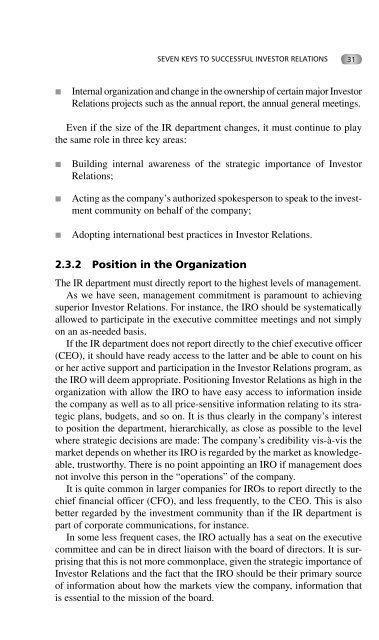Investor Relations
Investor Relations
Investor Relations
- No tags were found...
Create successful ePaper yourself
Turn your PDF publications into a flip-book with our unique Google optimized e-Paper software.
SEVEN KEYS TO SUCCESSFUL INVESTOR RELATIONS 31Internal organization and change in the ownership of certain major <strong>Investor</strong><strong>Relations</strong> projects such as the annual report, the annual general meetings.Even if the size of the IR department changes, it must continue to playthe same role in three key areas:Building internal awareness of the strategic importance of <strong>Investor</strong><strong>Relations</strong>;Acting as the company’s authorized spokesperson to speak to the investmentcommunity on behalf of the company;Adopting international best practices in <strong>Investor</strong> <strong>Relations</strong>.2.3.2 Position in the OrganizationThe IR department must directly report to the highest levels of management.As we have seen, management commitment is paramount to achievingsuperior <strong>Investor</strong> <strong>Relations</strong>. For instance, the IRO should be systematicallyallowed to participate in the executive committee meetings and not simplyon an as-needed basis.If the IR department does not report directly to the chief executive officer(CEO), it should have ready access to the latter and be able to count on hisor her active support and participation in the <strong>Investor</strong> <strong>Relations</strong> program, asthe IRO will deem appropriate. Positioning <strong>Investor</strong> <strong>Relations</strong> as high in theorganization with allow the IRO to have easy access to information insidethe company as well as to all price-sensitive information relating to its strategicplans, budgets, and so on. It is thus clearly in the company’s interestto position the department, hierarchically, as close as possible to the levelwhere strategic decisions are made: The company’s credibility vis-à-vis themarket depends on whether its IRO is regarded by the market as knowledgeable,trustworthy. There is no point appointing an IRO if management doesnot involve this person in the “operations” of the company.It is quite common in larger companies for IROs to report directly to thechief financial officer (CFO), and less frequently, to the CEO. This is alsobetter regarded by the investment community than if the IR department ispart of corporate communications, for instance.In some less frequent cases, the IRO actually has a seat on the executivecommittee and can be in direct liaison with the board of directors. It is surprisingthat this is not more commonplace, given the strategic importance of<strong>Investor</strong> <strong>Relations</strong> and the fact that the IRO should be their primary sourceof information about how the markets view the company, information thatis essential to the mission of the board.











